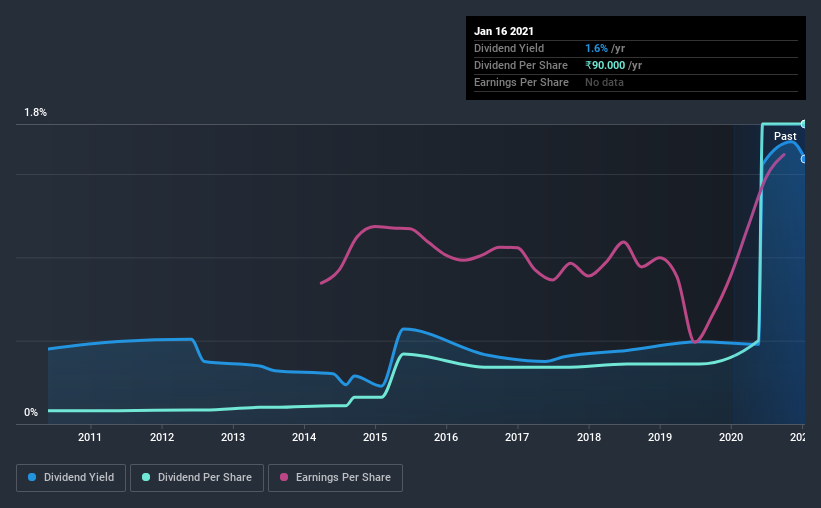How Does Bayer CropScience Limited (NSE:BAYERCROP) Fare As A Dividend Stock?
Dividend paying stocks like Bayer CropScience Limited (NSE:BAYERCROP) tend to be popular with investors, and for good reason - some research suggests a significant amount of all stock market returns come from reinvested dividends. Yet sometimes, investors buy a popular dividend stock because of its yield, and then lose money if the company's dividend doesn't live up to expectations.
While Bayer CropScience's 1.6% dividend yield is not the highest, we think its lengthy payment history is quite interesting. There are a few simple ways to reduce the risks of buying Bayer CropScience for its dividend, and we'll go through these below.
Explore this interactive chart for our latest analysis on Bayer CropScience!

Payout ratios
Companies (usually) pay dividends out of their earnings. If a company is paying more than it earns, the dividend might have to be cut. Comparing dividend payments to a company's net profit after tax is a simple way of reality-checking whether a dividend is sustainable. Looking at the data, we can see that 17% of Bayer CropScience's profits were paid out as dividends in the last 12 months. Given the low payout ratio, it is hard to envision the dividend coming under threat, barring a catastrophe.
In addition to comparing dividends against profits, we should inspect whether the company generated enough cash to pay its dividend. Of the free cash flow it generated last year, Bayer CropScience paid out 45% as dividends, suggesting the dividend is affordable. It's positive to see that Bayer CropScience's dividend is covered by both profits and cash flow, since this is generally a sign that the dividend is sustainable, and a lower payout ratio usually suggests a greater margin of safety before the dividend gets cut.
With a strong net cash balance, Bayer CropScience investors may not have much to worry about in the near term from a dividend perspective.
Consider getting our latest analysis on Bayer CropScience's financial position here.
Dividend Volatility
From the perspective of an income investor who wants to earn dividends for many years, there is not much point buying a stock if its dividend is regularly cut or is not reliable. For the purpose of this article, we only scrutinise the last decade of Bayer CropScience's dividend payments. During this period the dividend has been stable, which could imply the business could have relatively consistent earnings power. During the past 10-year period, the first annual payment was ₹4.0 in 2011, compared to ₹90.0 last year. Dividends per share have grown at approximately 37% per year over this time.
With rapid dividend growth and no notable cuts to the dividend over a lengthy period of time, we think this company has a lot going for it.
Dividend Growth Potential
While dividend payments have been relatively reliable, it would also be nice if earnings per share (EPS) were growing, as this is essential to maintaining the dividend's purchasing power over the long term. Bayer CropScience has grown its earnings per share at 8.2% per annum over the past five years. With a decent amount of growth and a low payout ratio, we think this bodes well for Bayer CropScience's prospects of growing its dividend payments in the future.
Conclusion
To summarise, shareholders should always check that Bayer CropScience's dividends are affordable, that its dividend payments are relatively stable, and that it has decent prospects for growing its earnings and dividend. It's great to see that Bayer CropScience is paying out a low percentage of its earnings and cash flow. We like that it has been delivering solid improvement in its earnings per share, and relatively consistent dividend payments. Overall, we think there are a lot of positives to Bayer CropScience from a dividend perspective.
Companies possessing a stable dividend policy will likely enjoy greater investor interest than those suffering from a more inconsistent approach. Still, investors need to consider a host of other factors, apart from dividend payments, when analysing a company. You can also discover whether shareholders are aligned with insider interests by checking our visualisation of insider shareholdings and trades in Bayer CropScience stock.
We have also put together a list of global stocks with a market capitalisation above $1bn and yielding more 3%.
If you decide to trade Bayer CropScience, use the lowest-cost* platform that is rated #1 Overall by Barron’s, Interactive Brokers. Trade stocks, options, futures, forex, bonds and funds on 135 markets, all from a single integrated account. Promoted
Valuation is complex, but we're here to simplify it.
Discover if Bayer CropScience might be undervalued or overvalued with our detailed analysis, featuring fair value estimates, potential risks, dividends, insider trades, and its financial condition.
Access Free AnalysisThis article by Simply Wall St is general in nature. It does not constitute a recommendation to buy or sell any stock, and does not take account of your objectives, or your financial situation. We aim to bring you long-term focused analysis driven by fundamental data. Note that our analysis may not factor in the latest price-sensitive company announcements or qualitative material. Simply Wall St has no position in any stocks mentioned.
*Interactive Brokers Rated Lowest Cost Broker by StockBrokers.com Annual Online Review 2020
Have feedback on this article? Concerned about the content? Get in touch with us directly. Alternatively, email editorial-team (at) simplywallst.com.
About NSEI:BAYERCROP
Bayer CropScience
Engages in the manufacture, sale, and distribution of insecticides, fungicides, herbicides, and various other agrochemical products and hybrid corn seeds in India, Germany, Bangladesh, and internationally.
Excellent balance sheet with reasonable growth potential.
Similar Companies
Market Insights
Community Narratives



